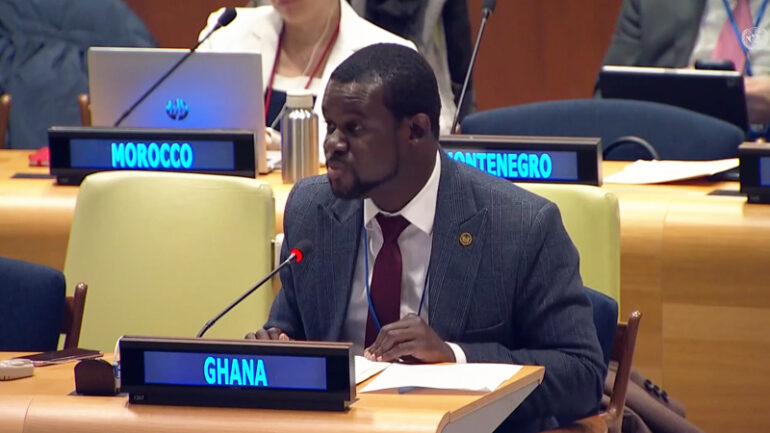Equitable Representation on and increase in the membership of the UNSC

- Posted by admin
- Posted in Statement & Remarks
The Question of equitable representation on and increase in the membership of the Security Council and other matters related to the Council.
Focus- Size of an enlarged Security Council and working methods of the Council, and relationship between the Security Council and the General Assembly
Co-chairs,
At the outset, I wish to join previous speakers in thanking you, cochairs for your proactive leadership and for the inclusive manner in which you are steering the affairs of this IGN session. Ghana aligns herself with the statement earlier delivered by the Permanent Representative of Sierra Leone on behalf of the Africa Group and would make some additional remarks in our national capacity.
Co-chairs,
We welcome the decision to webcast the first segment of each IGN Session and to have the interactive session in a closed format. We do so with the understanding that this development would aid in consolidating the gains made in this IGN session, including an enhancement of openness and transparency. Regarding the optimal size of an enlarged Council, we reaffirm, in accordance with the long-standing position of the Africa Group, as stipulated in the Ezulwini Consensus and Sirte Declaration, that the expansion of the permanent category should include two (2) permanent seats for Africa with all existing privileges, while the non-permanent seat should be increased by two (2) additional seats for Africa. We consider a total of not less than twenty-six (26) seats
an optimal size of an enlarged Security Council.
Co-chairs,
Further, we underscore that an enlarged Council should take into consideration elements that would enhance its efficiency. In this vein, the continuation/sustenance of Existing practices that promote the participation of other UN bodies and organs in the Council’s work should be deepened. Advisory notes by the Peacebuilding Commission to the Council as well as the PBC’s annual and ad hoc briefings to the Council have always been useful. Similarly, the occasional briefing to the Council by the President of the General Assembly and President of the International Court of Justice (ICJ) should be sustained and considered for other relevant bodies and agencies of the UN. Additionally, the General Assembly’s role in receiving the reports of the Security Council could be enhanced with a specific decision that it could transmit back to the Council through the President, after the consideration of the Council’s annual report.
This also brings to the fore the saliency of the veto initiative which allows the General Assembly to engage with the Council. These practices can further enhance the efficiency of the Council, as well as the transparency and accountability of the Council for the wider membership. To effectively deal with the myriad of security challenges facing the international community, home grown solutions and ownership must be embraced by the Council. While calling for priority to be given to the issue of effective cooperation with regional arrangements, it is equally important to underscore that Chapter VIII (8) of the UN Charter gives legitimacy/constitutional basis for
partnership with regional organizations as well as the crucial role of the latter in advancing global peace and security.
Co-chairs,
The issue of cooperation with regional and concerned countries ties into the subject of penholdership. It has been our long-standing position that a representative from the region where the crises
pertain, should pen or co-pen the file in the Council, hence our call for African pens for new African agenda items and copenholdership for existing African files. The simple reason for this position is that stakeholders in the region, who better understand the context and can adduce durable solutions to resolve the issue, are important actors in resolving these dynamic conflicts. This approach positions the Council to better diagnose the issue and proffer the right prescriptions that would sustainably cure the problem. We therefore need to urge the Council in its working methods to consider formalising arrangements for pens, similar to what occurs with the collective decision-making of the Council on subsidiary bodies. This could be done within the provisions of the Council’s Note 507 which signals the recognition that at all times, the collective ambitions, experiences and knowledge of Council members, including Member States that have a close connection to the issue or file, ought to be leveraged in drafting and negotiating outcome documents of the Council.
Co-chairs,
Clearly, the mandate of the General Assembly which encompasses initiating studies and making recommendations in the advancement of political cooperation, realization of human rights and fundamental freedoms, among others, complements the mandate of the Security Council in the advancement of global peace and security. It is therefore critical for us to explore ways by which
the Security Council and the General Assembly can better interact in order for us to harness the full potentials of the two distinct bodies and to make the Council more responsive to the existing and evolving security challenges of our time.
In conclusion, my delegation looks forward to cooperating with you and all other delegations in a manner that would ensure that we have convergence of views on these pertinent issues in order
to consolidate the gains made during this session.
I thank you
